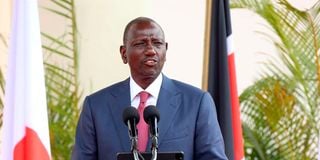Every worker must contribute to ‘hustlers mortage’, President Ruto insists

A file photo of President William Ruto.
What you need to know:
- Explaining to workers why the fund will benefit them at the expense of their employers, he urged them to force their employers to contribute.
- He also insisted that workers who earn high salaries and are able to service high mortgages must help those with fewer resources to secure home ownership.
President William Ruto has insisted that every worker must contribute to the Housing Fund, dismissing concerns raised by critics of the programme and pointing out that even workers who own houses or service mortgages must contribute to help low-income earners own homes.
He also criticised workers' representatives who have opposed the mandatory 3 per cent levy from workers' salaries and a matching contribution from their employers - capped at Sh5,000 per month - accusing them of representing employers' interests.
The President also referred to the National Housing Development Fund as a "hustler's mortgage" and whipped MPs to pass the proposal in the Finance Bill 2023, which aims to provide low-income Kenyans with the opportunity to own a home.
"Every MP and MCA has a mortgage, let's now plan the hustler's mortgage and we will plan it in the housing fund. We want to put all our money together so that we can create an opportunity for ordinary citizens to also have an opportunity to get a mortgage," said President Ruto.
He was speaking while presiding over the groundbreaking ceremony for the construction of the Lapfund Bellevue Park Residence Project in Nairobi, where 2,350 housing units will be built under the affordable housing programme.
Explaining to workers why the fund will benefit them at the expense of their employers, he urged them to force their employers to contribute.
"If you contribute Sh1,000 as an employee, your employer will also contribute Sh1,000 and the total of Sh2,000 will be yours. So immediately, even before you start, you are doubling your money by making sure that you force your employer to contribute towards the purchase of a house that you will call home," Dr Ruto said.
The President also attacked workers' representatives who have opposed the levy - which, if passed, will be compulsory for all workers and employers - asking, "If you are a workers' representative and you don't give workers the opportunity to own a house and get contributions to buy their houses (from their employers), are you representing the interests of the workers or the interests of the employers?".
He also insisted that workers who earn high salaries and are able to service high mortgages must help those with fewer resources to secure home ownership.
"The way to ensure that the ordinary mwananchi can secure a house that they can own based on their low income of Sh4,000 or Sh5,000 is to ensure that we do it together. If you can afford a Sh20,000 mortgage, you should also support the low income earners to afford Sh4,000 or Sh5,000," the President said.
He accused some leaders in his camp of plotting to sabotage the scheme, suggesting that they were aware of its planned implementation during the pre-election campaigns.
The President says he is betting that the affordable housing programme will create jobs for about one million youths who leave learning institutions each year, while also creating a market for thousands of Jua Kali artisans who make inputs for house construction.
He says the government's plan is to increase the proportion of affordable houses built in the country from the current 1 per cent of all houses built annually to half of all houses, while increasing the number of houses built annually from 50,000 to 200,000.
"The contribution you make to the housing fund is not a tax, it's your money," he said.
The President also says the government has addressed several challenges that have hindered the construction of affordable houses across the country by securing 4,000 acres of free land from county governments in 41 counties, removing taxes on affordable housing inputs and setting standardised measures for inputs.
"This is a programme we cannot afford to fail," he said.





